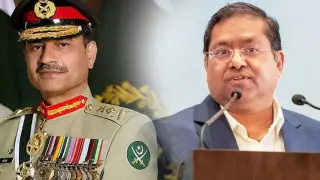
Airstrikes (X/meghupdates)
Israel continued its airstrikes on Hezbollah targets in Lebanon on Sunday, resulting in the deaths of over 100 people and injuring 359, according to Lebanon's health ministry. This escalation follows the killing of Hassan Nasrallah, the leader of Hezbollah, as the conflict in the region intensifies. Israel also launched airstrikes in Yemen, targeting Houthi positions as concerns of a broader Middle East conflict grow.
Lebanon's health ministry confirmed that 105 people were killed on Sunday as a result of Israeli airstrikes, with most casualties concentrated in the south and around the capital, Beirut. The strikes hit areas near Sidon and caused significant destruction in Beirut, where witnesses reported that a multi-story residential building was hit in central Beirut, marking the first attack in the city since the war in Gaza began last year.
The French foreign ministry announced that a second French national had been killed in the ongoing conflict, further amplifying international concern.
Massive Airstrikes by Israel on key installations in Yemen. Retaliation against the Missile launch by Houthis on Tel Aviv which was intercepted by Israeli ADS yesterday.
— Megh Updates 🚨™ (@MeghUpdates) September 29, 2024
Oil reservoirs, refineries, power plants, and airport in Houthi-controlled Yemen are up in flames right now.… pic.twitter.com/EArKaEks7z
The airstrikes occurred just days after Israel killed Nabil Kaouk, deputy head of Hezbollah’s Central Council, along with other senior commanders. Kaouk was the seventh Hezbollah leader killed in less than a week. On Friday, Ali Karaki, another top Hezbollah commander, was also killed in an Israeli strike. Hezbollah confirmed the deaths, including that of their leader Hassan Nasrallah, intensifying the group's retaliatory strikes on Israel.
In a related escalation, Israel targeted Houthi positions in Yemen on Sunday. Israeli military officials stated that dozens of airstrikes hit key infrastructure in Hodeida, including power plants and seaports, in retaliation for a ballistic missile attack on Ben Gurion airport, which occurred while Israeli Prime Minister Benjamin Netanyahu was arriving.
The ongoing conflict has led to a severe humanitarian crisis in Lebanon. The Lebanese government reported that over 1,000 people, including women and children, have died since the start of the hostilities. Around 250,000 people have sought shelter in government-run facilities, while many others have been displaced.
US President Joe Biden expressed concern over the growing conflict and warned Israeli Prime Minister Netanyahu against the risk of a broader regional war. White House national security spokesman John Kirby stated that the death of Nasrallah had severely weakened Hezbollah's command structure but warned that the group would likely attempt to rebuild.













Copyright © 2025 Top Indian News
